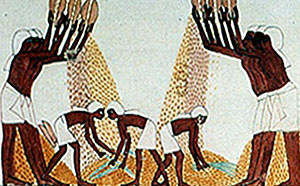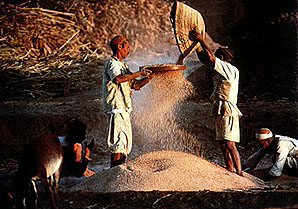"Agri-culture" is thus not just a way of growing food; it involves a whole spectrum of cultural changes and adaptations by early human communities. The demands and effects of practicing agriculture as a means of survival created a new kind of community life, with new opportunities and new problems for humanity. In the early agricultural villages of 10,000 years ago, the seeds of our own way of life were sown: economic specialization, the possibility of private as opposed to or complementary to communal life; the opportunity to accumulate wealth in material objects; the opportunity to accumulate new techniques and tools and knowledge.
 However, as the Egyptian tomb painting and photograph of village life in India illustrate, for the great majority of the world's people, the technology of the ancient world is still being used. In a sense, then, the ancient world is not over; it is not entirely in the past, but is still present among us. This should remind us that the fundamental problems encountered by the earliest agriculturalists--dependency on the weather, degradation of the environment, over-population, vulnerability to epidemic disease, finding security from the depredations of other human beings--have never been solved.
However, as the Egyptian tomb painting and photograph of village life in India illustrate, for the great majority of the world's people, the technology of the ancient world is still being used. In a sense, then, the ancient world is not over; it is not entirely in the past, but is still present among us. This should remind us that the fundamental problems encountered by the earliest agriculturalists--dependency on the weather, degradation of the environment, over-population, vulnerability to epidemic disease, finding security from the depredations of other human beings--have never been solved.
Human societies have, from time to time, achieved temporary successes in dealing with these problems. But the problems have a way of re-emerging in new forms. These problems, in fact, form the common fabric of human existence for the past 10,000 years, whether we live in advanced industrialized societies or in primitive agricultural villages.
 However, as the Egyptian tomb painting and photograph of village life in India illustrate, for the great majority of the world's people, the technology of the ancient world is still being used. In a sense, then, the ancient world is not over; it is not entirely in the past, but is still present among us. This should remind us that the fundamental problems encountered by the earliest agriculturalists--dependency on the weather, degradation of the environment, over-population, vulnerability to epidemic disease, finding security from the depredations of other human beings--have never been solved.
However, as the Egyptian tomb painting and photograph of village life in India illustrate, for the great majority of the world's people, the technology of the ancient world is still being used. In a sense, then, the ancient world is not over; it is not entirely in the past, but is still present among us. This should remind us that the fundamental problems encountered by the earliest agriculturalists--dependency on the weather, degradation of the environment, over-population, vulnerability to epidemic disease, finding security from the depredations of other human beings--have never been solved. "Agri-culture" is thus not just a way of growing food; it involves a whole spectrum of cultural changes and adaptations by early human communities. The demands and effects of practicing agriculture as a means of survival created a new kind of community life, with new opportunities and new problems for humanity. In the early agricultural villages of 10,000 years ago, the seeds of our own way of life were sown: economic specialization, the possibility of private as opposed to or complementary to communal life; the opportunity to accumulate wealth in material objects; the opportunity to accumulate new techniques and tools and knowledge.
"Agri-culture" is thus not just a way of growing food; it involves a whole spectrum of cultural changes and adaptations by early human communities. The demands and effects of practicing agriculture as a means of survival created a new kind of community life, with new opportunities and new problems for humanity. In the early agricultural villages of 10,000 years ago, the seeds of our own way of life were sown: economic specialization, the possibility of private as opposed to or complementary to communal life; the opportunity to accumulate wealth in material objects; the opportunity to accumulate new techniques and tools and knowledge.